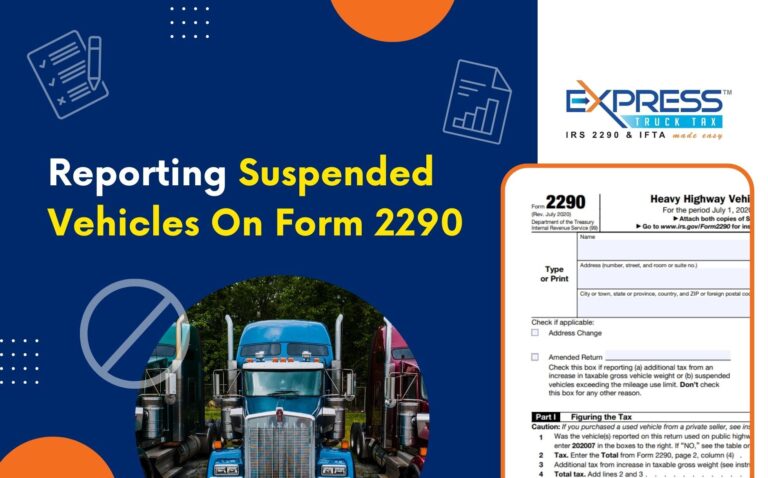What is Form 2290?
Form 2290 is a tax form that has to be filed with the IRS for the Heavy Vehicle Use Tax (HUVT) if you have a vehicle weighing 55,000 pounds or more. Form 2290 must be filed every year by August 31st. The tax year for Form 2290 is from July 1st to June 30th of the following year and is filed for the upcoming tax year. The amount of tax owed to the IRS will depend on the Taxable Gross Weight of the vehicle and the vehicle’s first use month. If the vehicle has been on the road for over a year or is being put on the road for the first time this month, the First Used Month (FUM) will be July. If a vehicle is put on the road any other month, that month will be its FUM and the tax amount owed will be prorated for the amounts that remain in the tax year. The only way that no tax will be owed to the IRS for the HVUT is if the vehicle is considered suspended. Filing suspended vehicles on Form 2290 is made easy with ExpressTruckTax, a leading Form 2290 e-filer where you can file your Form 2290 quickly and easily.
When is a vehicle considered suspended by the IRS?
When filing Form 2290, a vehicle that weighs 55,000 pounds or more is considered suspended by the IRS if it is driven less than 5,000 miles in a year, or less than 7,500 miles if it is used for agricultural purposes. If these requirements are met, you are still required to file Form 2290 but will not owe a tax for the HVUT for this vehicle. This is because it is considered suspended by the IRS.
What happens if you file a vehicle as suspended but it exceeds mileage?
If a vehicle is filed suspended but actually exceeds the mileage required for it to be considered suspended, a Form 2290 Amendment for Low Mileage Exceeded will have to be filed with the IRS. ExpressTruckTax also offers this service. When you go to file your form, you will select that you want to file a Form 2290 Amendment for Mileage Exceeded and specify the reason you are amending it. Once you file this amendment, the tax amount due to the IRS will have to be paid.
What happens if you file a vehicle as not suspended and mileage is not exceeded?
If you do not file a vehicle suspended but ends up not exceeding the mileage limit, you can file Form 8849 to receive a tax credit for the amount of tax you paid for the vehicle for the HVUT. You will go to ExpressTruckTax and select Form 8849 as the one you want to file. When filing this form it is important to keep in mind that the IRS must process each form manually so it may take a while before you receive your tax credit.
Why should you file with ExpressTruckTax?
Whether you need to file your vehicle as suspended or not, ExpressTruckTax has your back. You can file whichever form you need to file for the HVUT whether it is a Form 2290, a Form 2290 Amendment, or a Form 8849 and you will receive your stamped Schedule 1 in minutes after filing with ExpressTruckTax. If you are affiliated with a company, you can even request that we send the stamped Schedule 1 directly to them. You can also choose to have it faxed or mailed to you, but regardless of your choice, ExpressTruckTax will email you your stamped Schedule 1 as soon as the IRS accepts your Form 2290.
Filing with ExpressTruckTax is quick and easy. It is a simple all-around process and when you file there is a built-in VIN checker to ensure your VIN is correct. There are six questions that the form asks you and after that you are finished. Select the payment method you wish to use and follow the instructions that follow. If you file your vehicle as suspended, however, you will not be required to pay this tax for the HVUT. You will however transmit Form 2290 to the IRS to receive your stamped Schedule 1 as proof of filing the form. With the stamped Schedule 1 you are able to get your vehicle’s registration and tags.
What are you waiting for? File your Form 2290 with ExpressTruckTax today for fast and easy filing, even if you have a suspended vehicle you need to file.

